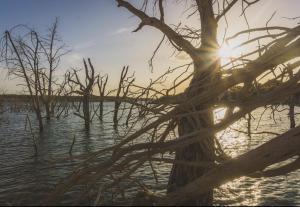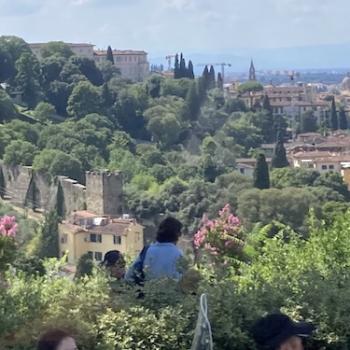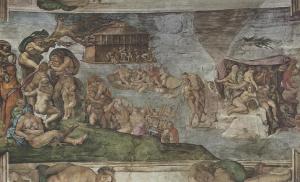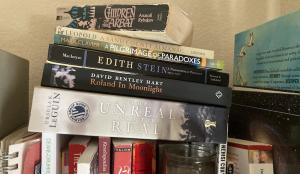Should we prefer the active or the contemplative life? My students and I have been wrestling with that classical theological question this semester in particular. We are educating ourselves about the climate emergency and asking what role theological leaders can play. One thing that we’re noticing is that it can feel like the wrong time for contemplation.

In fact, calling it (correctly) an emergency already funds this sense of misspent time. Augustine called contemplation of God the work of “holy leisure.” Sometimes, he said, charity demands setting aside the quiet life and dealing with the emergency. You don’t fiddle while Rome burns. You don’t write sonnets when the basement is flooding. And you don’t do theology while the planet burns and floods.
Climate Emergency as Loss of Imagination
Yes. And.
As our class watches documentaries, learns from farmers and hunters, and reads nature poets, we are discovering a counter-culture of visionaries. Visionaries whose practices are informed by what looks to me like a heavy dose of contemplation.
A key—perhaps the key—failure of our age is a failure of imagination. We have lost the ability to look out on our world like children and see a million possibilities. An old grove of fruitless trees was once, for my cousins and me, a land of fairies and goblins, of wild stories and danger. As my imagination narrowed, though, I saw only the dead limbs and neglect and thought of how to clean it up.
We now look on wild places most often as a piece of earth that could produce something useful. The grove could become, for instance, a sprawling neighborhood with watered lawns. Similarly, a hillside could become a flattened field with no trees or fencerows, allowing us to maximize the crop. (Evidence, by the way, that we have forgotten the command of Leviticus to imitate God’s holiness by leaving the edges of the fields unharvested).
Boring as Sin
All of this has got me thinking about Hannah Arendt. Arendt was philosopher who wrote, among other things, about the trial of Adolf Eichmann, one of the architects of the Final Solution in Germany.
Now, connections of any sort to National Socialism are risky and in need of disclaimers. This is not the Third Reich. There is no Eichmann or Hitler of the climate emergency. I am recalling, though, what Arendt noticed, when the nascent Israeli government brought its enemy to Jerusalem to stand trial for warcrimes.
Despite all expectations, Arendt said, this wicked human being was not spectacularly diabolical. Instead, he was thoroughly boring. “Boring as sin,” as my colleague Nathan likes to say. He spoke in the cliches and mundane phrases of a company man. His world was memos and reports. He was like a Dilbert cartoon, or a character on the The Office, gone terribly, horribly wrong.
Central to Eichmann’s banality, according to Arendt, was his inability to speak or even understand metaphors and figural language. His humanity had so thoroughly eroded that he considered the murder of millions to be a good day at the office. And the chief symptom was his lack of imagination. He looked on Jewish life as a problem to be solved with death. He could not imagine those lives and faces as anything else.
An Invitation to Holy Leisure
The saints, Maximus the Confessor tells us, are people of great imagination. They are like children who look on that fruitless orchard and hear the invitation to adventure. They step into a wild world and hear the beckoning of a God who exceeds it all. A God who is always within the trees and the adventure and the face of friends and strangers, but also always beyond them. A God whose immanence is also a transcendence—that’s the weighty theological language for that particular mystery.
This mysterious God is the one who invited both wild and cultivated places into existence: “let there be.” Earth’s risk, now, is that humans can no longer hear God’s magical invitation in either sort of place. The earth itself has become an interference in our plan.
If that’s true, then I suspect theological contemplation still has a role to play in the age of climate emergency. We’re going to need moments of holy leisure, even while we pass the buckets to put out fires or take a turn sticking our fingers in the cracked dikes. We’ll need, still, to sit with the metaphors and figural language of the Psalms and Wisdom Literature. Only that sort of brilliant, child-like imagination can help us see the great divine invitation in the places and creatures we encounter. How a field with unharvested edges is holy like God. How a forest or a fencerow is a gift of life.
All created things, from twisted limbs to fellow humans, are fathomless mysteries of divine grace. We may simply need a moment of holy leisure to notice.
Thanks to my colleague Scott Bader-Saye for a really good conversation about the ideas in this post.











